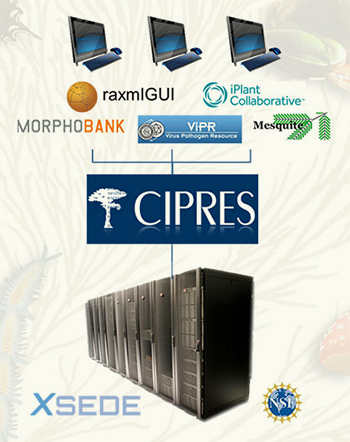
SDSC’s CIPRES Science Gateway Receives $1.5 Million National Science Foundation Award
NSF Grant to Make Supercomputers More Accessible to Phylogeneticists
By:
- Jan Zverina
Published Date
By:
- Jan Zverina
Share This:
Article Content
The San Diego Supercomputer Center (SDSC) at the University of California, San Diego has received a $1.5 million award from the National Science Foundation (NSF) to make access to supercomputing resources simpler and more flexible for phylogenetics researchers.

The new NSF award, which follows an earlier NSF grant that ran from 2003 to 2008, is for the CIPRES Science Gateway, a web site that allows researchers to explore evolutionary relationships between species using supercomputers provided by the NSF XSEDE project. CIPRES stands for CyberInfrastructure for Phylogenetic REsearch, and XSEDE stands for eXtreme Science and Engineering Discovery Environment.
Access to supercomputers is a key part of modern evolutionary science, where evolutionary relationships are explored by comparing DNA sequence information between species. This type of analysis is becoming more and more powerful as the number of DNA sequences available is increasing rapidly, but analyzing these new, larger data sets requires high levels of computational power.
“The CIPRES Gateway allows scientists to conduct their research in significantly shorter times without having to understand how to operate supercomputers,” said Mark Miller, principal investigator of the CIPRES gateway and an SDSC researcher. To date, the CIPRES Science Gateway has supported more than 6,000 users and has led to more than 600 publications of phylogenetic studies involving species in every branch of the Tree of Life.
“The new award will make it possible for us to take access to supercomputers to the next level, so researchers are not constrained by the existing browser interface,” said Miller. “Rather the web services we will develop will enable researchers to run jobs on supercomputers directly from their preferred desktop computing environment, whether it is a complex, highly evolved phylogenetics package or a simple Python script.”
Specifically, the NSF award, which started May 1 and runs for three years, will fund the creation of a more general application programmer interface for CIPRES that uses REST (REpresentational State Transfer) web services. This will make it possible for any developer to incorporate the CIPRES tools into their application. The award will also establish collaborations between the CIPRES Science Gateway project and eight other well-developed software packages used by phylogenetics researchers, including Mesquite, Morphobank, iPlant Discovery Environment, raxmlGUI, bioKEPLER, the Virus Pathogen Resource, the National Center for Genome Analysis Support, and the Influenza Research Database.
Developers in each of these projects will work closely with CIPRES Gateway developers to incorporate the CIPRES REST services into their respective applications. The project will also support scientists who know how to write simple scripts to submit jobs directly to XSEDE supercomputers without the need for a browser interface.
The NSF award number is DBI-1262628. The project is called “ABI: Development: Bringing Supercomputing to the Desktop: New Capabilities for Phylogenetic Inference in the Era of Data-Driven Biology.”
Share This:
You May Also Like
Stay in the Know
Keep up with all the latest from UC San Diego. Subscribe to the newsletter today.


